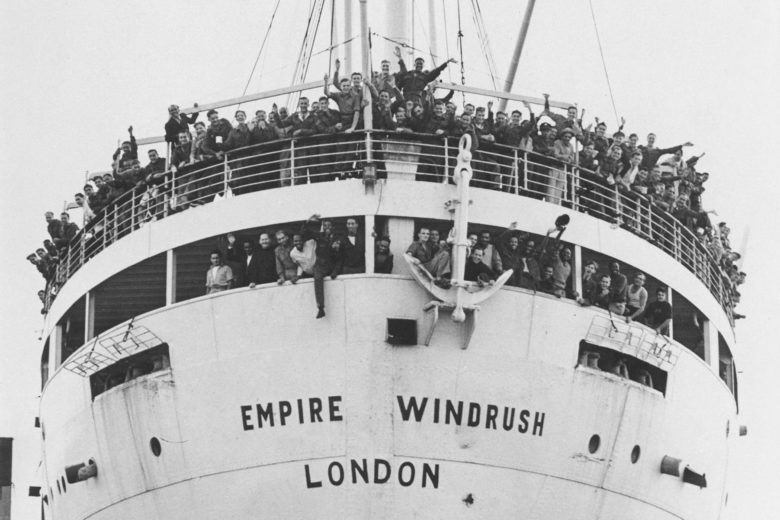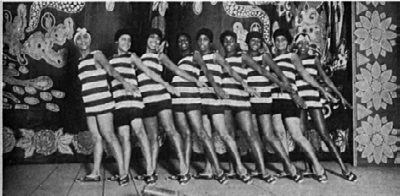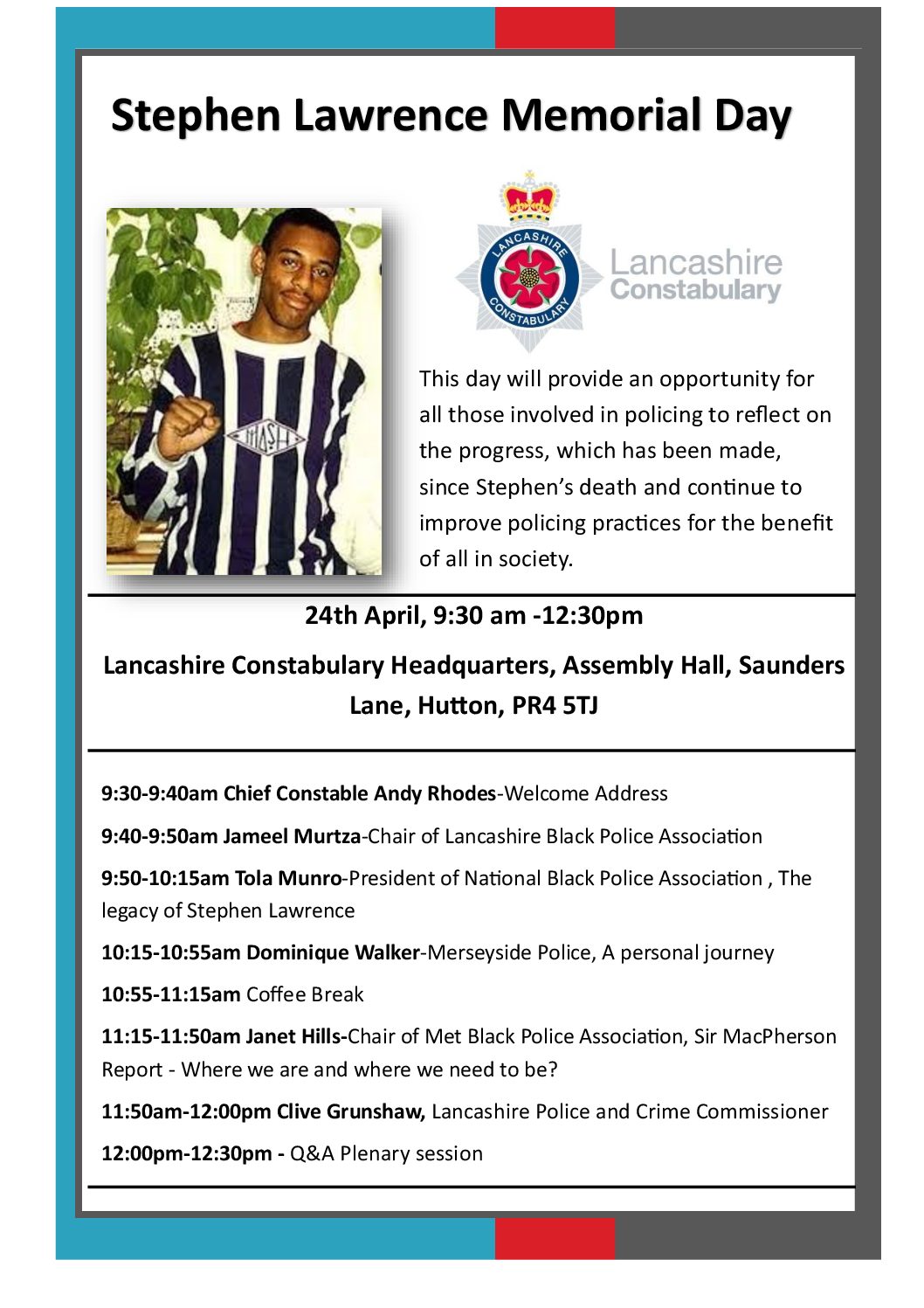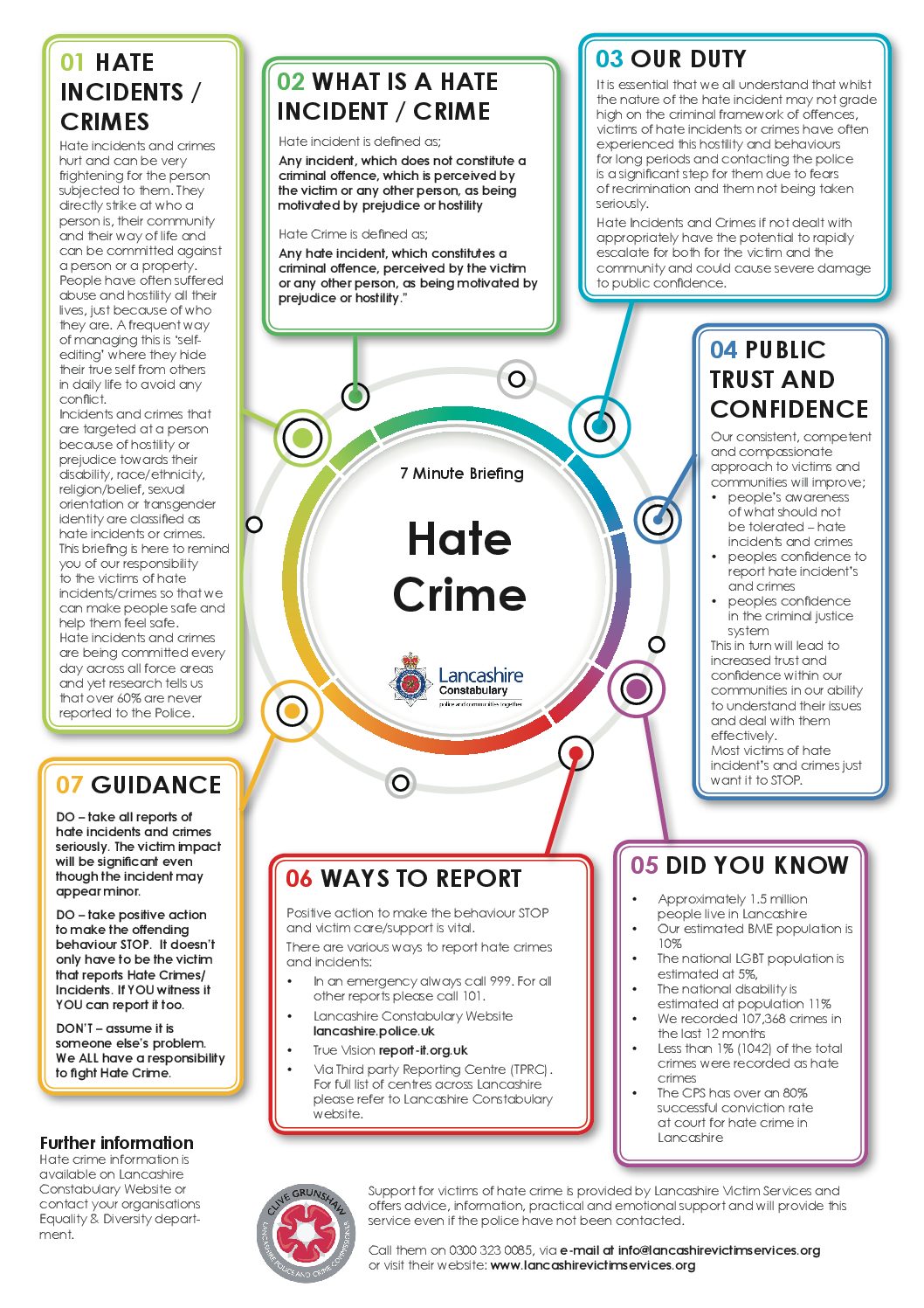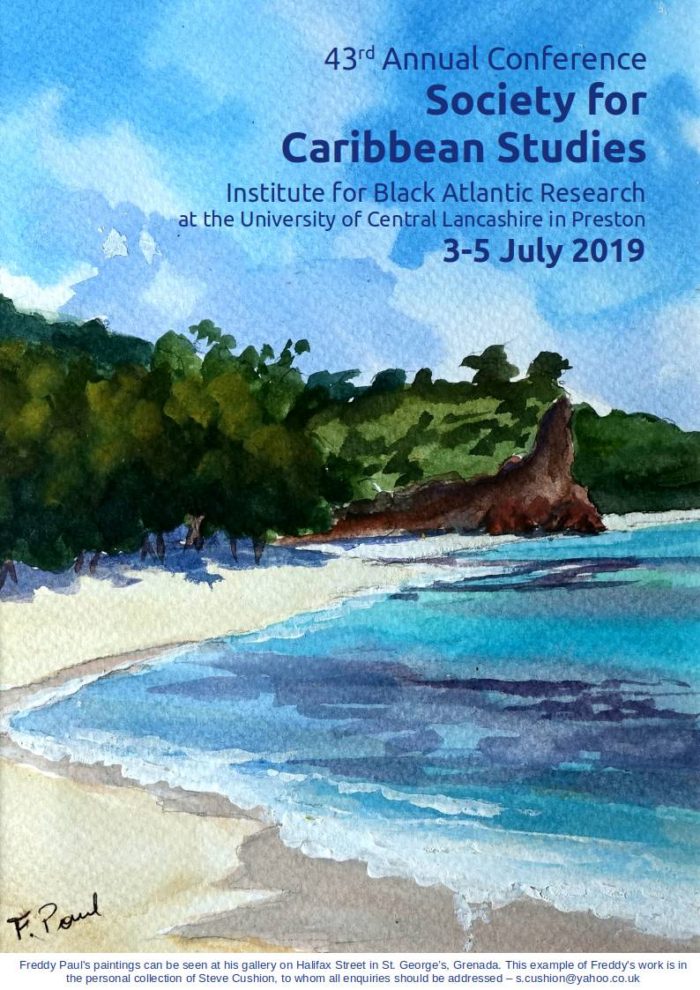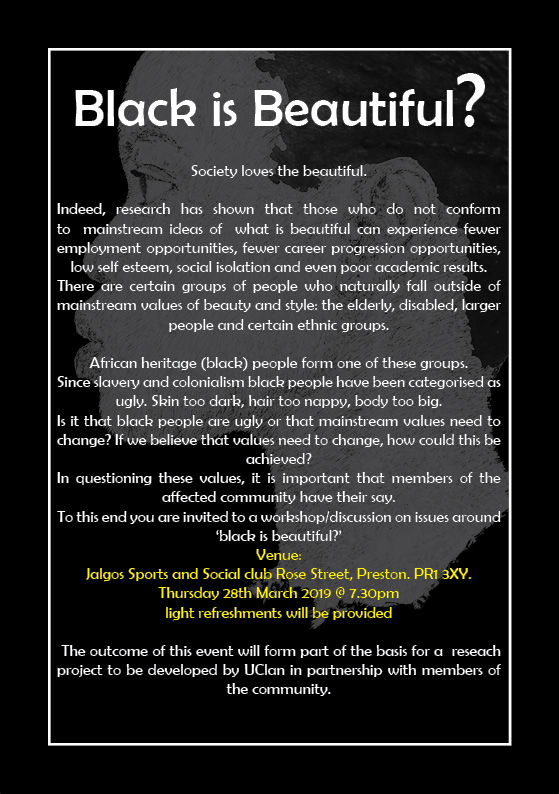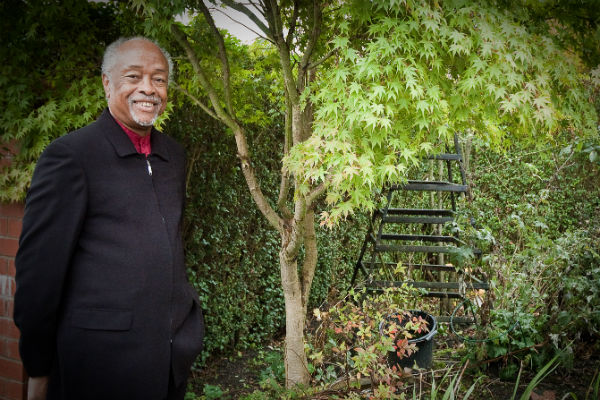Archive for the ‘What’s On’ Category
Refugee Week 2019 – Caribbean Lunch and Lecture – Windrush Day Celebration: Black People in Britain
Date and Time: Fri, 21 June 2019, 12:00 – 13:30 BST
Location: UCLan – University of Central Lancashire, Foster building – Scholars Restaurant, Kendal Street, Preston, PR12HE
Programme – Lunch and Lecture:
12.00 – 12.25 – Registration and Lunch
12.25-12.30 – Open remarks – EDIC UCLan and Preston Black History Group
12.30:1.00 pm – Lecture: ‘Black People in Britain before Windrush – Stories of Migration’ by Lecturer Rapahel Hoermann
1.00 – 1.30 pm – Testimonials from Windrush Role Models and discussion
Limited places. So booking is a must! Details here
Refreshments and an afro-caribbean food will be provided.
This lecture will be delivered by Dr. Raphael Hoermann. He is Senior Research Fellow at the Institute for Black Atlantic Research (IBAR) and Lecturer in English Literature at the University of Central Lancashire (UCLAN).
Black people have been living in Britain at least since Roman Times. While it is true that the large-scale migration of Black people did only start after WWII with the so-called “Windrush Generation” of Black Britons, they have been present in public records long before.
Nevertheless their lives and stories have largely been expunged from public consciousness and historiography. Mainstream historians have also chosen to silence them, despite the best counter efforts to unearth their lives undertaken by scholars of British Black history (e.g. Peter Fryer, Ron Ramdin, Ray Costello & David Olusoga).
Indeed the wealth of material and the scale of the contributions of Black Atlantic people to British history are so immense (especially considering their relative small numbers) that this lecture can only scratch the surface. It will re-appraise their contributions by focusing on three outstanding and diverse Black Atlantic figures from three centuries: the ex-slave, abolitionist and author of the most famous British slave narrative, Olaudah Equiano (c. 1745-97), the ultra-radical Black Atlantic agitator Robert Wedderburn (1762-1835/36?) and Jamaican-born poet, broadcaster and feminist Una Marson (1905-66), who became the first black producer at the BBC.
Following this lecture we will welcome three guest speakers from the Windrush generation to give their testimonials and open the discussion. This will be facilitated by Clinton Smith – Chair of Preston Black History Group.
GENDER, ‘RACE’ AND PERFORMANCE: RE-VISITING THE BLACK ATLANTIC
Tuesday, 11 June 2019 at 10:00 – Wednesday, 12 June 2019 at 17:00 (BST)
502 Teaching Hub, University of Liverpool, University Place, Liverpool, UK
2018 marked the 25th anniversary of the publication of Paul Gilroy’s pioneering The Black Atlantic: Modernity and Double Consciousness (Cambridge University Press).
This conference aims to commemorate and dialogue with Gilroy’s seminal study, one that continues to serve as a reference point for scholars working on the intersection of the African diaspora, cultural production and issues of identity.

Stephen Lawrence Memorial Day
24th April, 9:30 am -12:30pm
Lancashire Constabulary Headquarters, Assembly Hall, Saunders Lane, Hutton, PR4 5TJ
9.30 – 12.30
This day will provide an opportunity for all those involved in policing to reflect on the progress, which has been made, since Stephen’s death and continue to improve policing practices for the benefit of all in society.
For details please contact Ashley Gibson, South Division Vulnerability Hub (Hate Crime and Diversity), SouthDiversity@lancashire.pnn.police.uk
Sat 22nd June – Windrush Celebration Day
SAVE THE DATE!!
A partnership of organisations in Preston were supported by PBHG and succeeded in receiving government funding for events around Windrush Celebration Day – please check in coming months for updates on events taking place.
Hate Crime Poster
Our partner PC 3448 Ashley Gibson at Lancs Constabulary Diversity Unit has sent us this poster about Hate Crime and how to report it. Please share it widely. Thanks
You can contact Ashley at southdiversity@lancashire.pnn.police.uk
Society for Caribbean Studies 43rd Annual Conference
Institute for Black Atlantic Research,
University of Central Lancashire
3-5 July 2019
http://www.caribbeanstudies.org.uk/
Draft programme can be downloaded here
Preston Black History Group have been invited to make a presentation at the conference. Details will be available when they have been confirmed. Hope you can join us.
Meet the author Reni Eddo-Lodge in conversation with Jade Montserrat – IBAR event
Thursday 4th April at 6 – 7.30pm, UCLan Mitchell and Kenyon Cinema.
Tickets free from Eventbrite
About this Event
Institute for Black Atlantic Research (IBAR) presents:
Reni Eddo-Lodge top 100 bestselling Author of Why I’m No Longer Talking to White People About Race
Reading Extracts from her work and In conversation with Award winning artist Jade Montserrat followed by Q&A with the audience.
Reni graduated from UCLAN in English Literature in 2011 and was the Student Union President 2011-12. She has written for The Guardian and The New York Times
Jade won the Jerwood Student Prize in 2017 & contributed the artwork for the Night Tube map on the London Underground in 2018.
Date and Time
Thu, 4 April 2019
18:00 – 19:30 BST
Location
The Mitchell And Kenyon Cinema
Foster Building
58 Kendal St
Preston
PR1 2HE
Black is Beautiful?
Society loves the beautiful.
Indeed, research has shown that those who do not conform
to mainstream ideas of what is beautiful can experience fewer
employment opportunities, fewer career progression opportunities,
low self esteem, social isolation and even poor academic results.
There are certain groups of people who naturally fall outside of
mainstream values of beauty and style: the elderly, disabled, larger
people and certain ethnic groups.
African heritage (black) people form one of these groups.
Since slavery and colonialism black people have been categorised as
ugly. Skin too dark, hair too nappy, body too big.
Is it that black people are ugly or that mainstream values need to
change? If we believe that values need to change, how could this be
achieved?
In questioning these values, it is important that members of the
affected community have their say.
To this end you are invited to a workshop/discussion on issues around
‘black is beautiful?’
Venue:
Jalgos Sports and Social club Rose Street, Preston. PR1 3XY.
Thursday 28th March 2019 @ 7.30pm
light refreshments will be provided
The outcome of this event will form part of the basis for a reseach
project to be developed by UClan in partnership with members of
the community.
PBHG Points of Light award
We are proud that our Chair, Clinton Smith, was invited to 10 Downing St in October 2018 to receive a ‘points of light’ award recognising our work and committment to promoting diversity and improving multicultural understanding.
Here’s a link to the Points of Light website
IBAR UCLan » Women’s Spring: Feminism, Nationalism and Civil disobedience conferenc
Angela Davis, painted portrait IMG_6929004, April 10, 2013 | © Courtesy of Thierry Ehrmann.
Review by Lauren Velvick, representing Preston Black History Group
On the 22nd and 23rd of June I was lucky to be able to attend the annual conference organised by the Institute for Black Atlantic Research at the University of Central Lancashire. This year’s conference was titled ‘Women’s Spring: Feminism, Nationalism and Civil Disobedience’ and invited contributions reflecting on struggles for women’s rights around the world, particularly how art, music, fiction and other forms of culture have contributed to these movements. I am not currently a student or academic and I don’t attend conferences of this kind very often, so it was a real treat to be able to hear about the current research that’s going on in universities from Delhi to Washington.
The first talks that I attended dealt with how the concept of the family relates to how nationality and borders are enforced, with Dr Umut Erel giving a keynote speech titled ‘Black and Migrant Women Challenging Nationalist and Racist Politics of Reproduction’. This talk clearly laid out how a web of changing boundaries meaning that it is often impossible for migrant families to exist and thrive in Britain, with integration ‘always constructed as just out of reach’. Materially, this is exacerbated by the way that adult migrants are left with no recourse to public funds, and are thus forced into destitution, creating a feedback loop of poverty. This can be observed in the recent evictions of Syrian refugees in Glasgow by a private housing company; it seems obvious that people who speak little english, with no contacts and no money, will become homeless or worse if they are evicted, but legally nobody has to do anything if somebodies refugee status is not granted on first hearing.
Dr Erel laid out how this state of affairs arises from the concept of a nation being built on the right to exclude, arguing that the first way to fight back against these injustices that dehumanise people in need is to challenge the current policy of ‘no recourse to public funds’ for migrants.
Next I sat in on the ‘Women’s movements in India’ panel which gave a fascinating and vital insight into political and feminist struggles there, but speakers were careful to point out how the lived realities of women differ greatly between the affluent and the poverty-stricken, and should not be homogenised in an attempt to understand the country as a whole.
Particularly interesting to me was Dr Namrata Ravichandra Ganneri’s talk on the women who organised as part of the right wing All India Hindu Mahila Mahasabha party, raising the question of how we can responsibly biographise right wing women as part of feminism. This is something that we must grapple with in Britian as well, given that our only two female Prime Ministers were and are on the right, but experienced the same structural sexism as everyone else, if in different ways as members of the political elite.
The final Keynote that I was able to attend that day was from Prof. Cathy Cohen who advocated for naming the problems that we face, and naming them repeatedly. This emphasis on the power of naming brings to mind Lubaina Himid’s ‘Naming the Money’ series which have been displayed in various museums around the UK this year.
Cohen paid particular attention to ‘the margins of blackness’, criticising the erasure of queer black radicality from narratives of resistance in the 1970’s, 80’s and 90’s. She also draw attention to our tendency to politically scapegoat, rather than address issues, which can lead to white people only addressing their own marginalisation through right wing figureheads. Cohen ended by affirming the importance of working with what the people in our communities can bring, rather than expecting people to be perfect political subjects, and to build resilience by rolling with the changes and shocks that arise within resistance movements.
